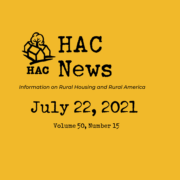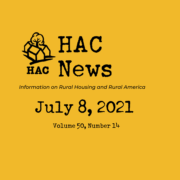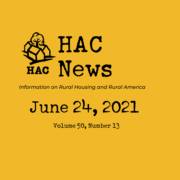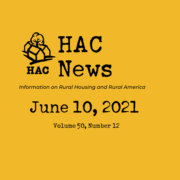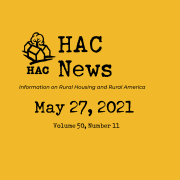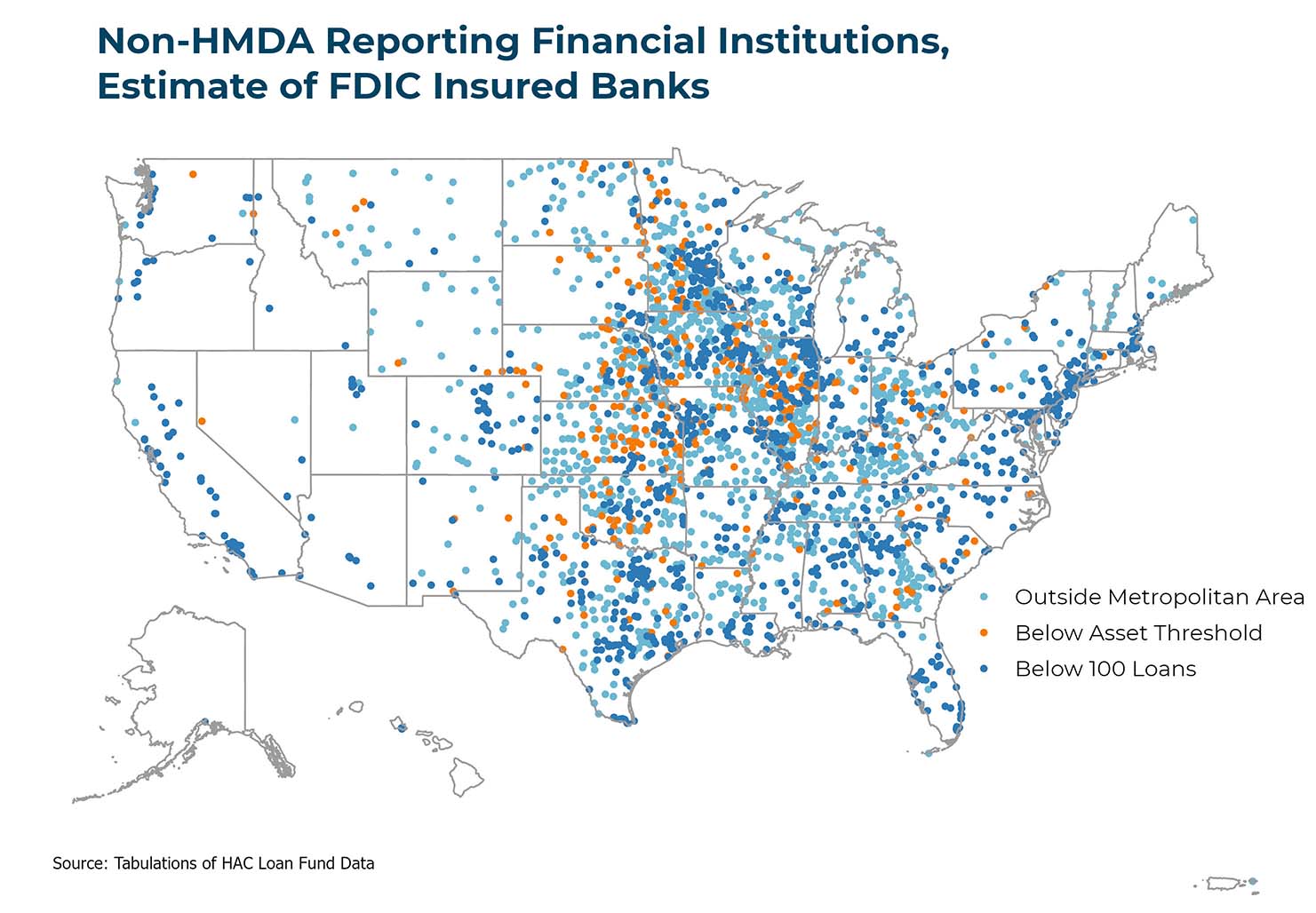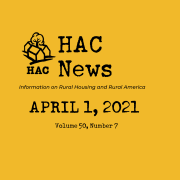HAC News: July 22, 2021
Vol. 50, No. 15
TOP STORIES
FY22 housing funding to be considered in House before end of July.
The House of Representatives has rolled several appropriations bills, including the USDA and HUD bills, into a “minibus” for consideration during the week of July 26. The measures, as approved by the House Appropriations Committee, would increase some USDA rural housing programs and most HUD programs above their FY21 funding levels. The committee’s draft report on the USDA bill urges attention to farmworkers’ needs, while the draft report on HUD funding encourages support for Central Appalachian communities impacted by the downturn in the coal industry and gives HUD some specific instructions on its FY22 funding competition for Native American housing grants.
OCC will propose rescinding 2020 Community Reinvestment Act rule.
Acting Comptroller of the Currency Michael Hsu announced on July 20 that his office will propose reversing the CRA regulation it issued in June 2020, which has not yet gone into effect. He pledged to work with the Federal Reserve Board and Federal Deposit Insurance Corporation, which did not join the OCC’s 2020 rule, to develop a new proposal based on a Fed notice published in October 2020. HAC’s comments on the Fed’s notice and on an earlier draft of the OCC’s 2020 rule are posted online.
Bills outline House Democrats’ housing infrastructure priorities.
Three bills introduced by Rep. Maxine Waters (D-CA), chair of the House Financial Services Committee, would provide new support for housing programs, including rural housing. Although the administration included housing funds in its American Jobs Plan infrastructure proposal, housing is not covered in the Senate’s $1.2 trillion bipartisan infrastructure bill and it is not yet clear what housing provisions will be in the Senate Democrats’ $3.5 trillion reconciliation bill, which will also address healthcare, climate change, and more. The three Waters bills are intended to mark the Chairwoman’s housing priorities for the reconciliation package, with negotiations not expected to begin in earnest until this fall after the bipartisan package is completed.
Waters’s Housing is Infrastructure Act would invest over $600 billion in housing infrastructure, including vouchers, public housing capital needs, the National Housing Trust Fund, HOME, and other HUD programs. Many of the HUD provisions include a 10% setaside for areas of persistent poverty. Additionally, the bill would provide $5 billion to fully address the capital needs backlog of the Section 515 and 514 rural housing programs, $500 million for Section 504 homeowner repair grants (not restricted to elderly owners, as the grant program usually is), $2 billion for Native American and Native Hawaiian Housing Block Grants, and setasides of $2 billion and $250 million in CDBG funds to address the housing and community infrastructure needs of colonias and resident-owned manufactured housing communities, respectively. A $10 billion program for neighborhood revitalization would include $250 million for SHOP and a $500 million setaside for communities outside metropolitan areas.
The Ending Homelessness Act would transform the Housing Choice Voucher program into a federal entitlement and the Downpayment Toward Equity Act would provide $100 billion to help first-generation homebuyers.
Housing costs remain out of reach throughout the country.
There is no state, county, or metropolitan area in the U.S. where a full-time minimum-wage worker can afford a modest two-bedroom rental home, according to the National Low Income Housing Coalition’s Out of Reach: The High Cost of Housing 2021 report. Data is available by county, zip code, state, and metro area on NLIHC’s site.
OMB will not raise population threshold for metro areas.
On January 19, 2021, OMB published a proposal to change its definition of metropolitan statistical areas so that an area would need a population of at least 100,000 rather than 50,000 to be considered metropolitan. After receiving more than 800 comments, the vast majority of them – including HAC’s – opposing the change, OMB has decided to keep the metro area threshold at 50,000 and to conduct further research on the subject. Delineations of areas based on the 2020 standards and 2020 Census data will be published in 2023. For more information, contact Bob Sivinski, OMB, 202-395-1205.
House committee advances rural broadband bill.
On July 14 the House Agriculture Committee approved H.R. 4374, the Broadband Internet Connections for Rural America Act, which would revise USDA’s broadband programs and increase available funding.
OPPORTUNITIES
Self-Sufficiency Service Coordinator funds available.
Resident Opportunity and Self-Sufficiency Service Coordinator funding enables nonprofits, PHAs, TDHEs, tribes, and resident associations to assess HUD-assisted residents’ needs and link them to training and services. Applications are due September 17. For more information, contact HUD staff, ROSS-PIH@hud.gov.
Pandemic-related fair housing enforcement opportunity opens.
The Fair Housing Initiatives Program – Private Enforcement Initiative American Rescue Plan will fund experienced fair housing enforcement organizations to conduct new projects relating to discrimination arising in connection with the pandemic or to sustain core fair housing enforcement and education activities. Apply by August 18. For more information, contact Kimberly Harley, HUD, 202-402-4753.
HAC seeks Community Facilities Housing Specialist.
The Community Facilities Housing Specialist identifies and engages community stakeholders and provides direct technical assistance to rural organizations that are developing facilities such as parks, community centers, public libraries and childcare centers. This includes helping them identify, utilize, and apply for financial resources such as USDA Community Facilities grants and loans. This is a two-year position and is eligible for telecommuting.
RuralSTAT – UPDATE AND RETRACTION.
HAC has received several questions and comments regarding the RuralSTAT on ‘USDA Exited Properties’ published in the July 22 edition of the HAC News. While we believe the analysis is substantively accurate, there have been some concerns and discrepancies identified with the underlying data used for that RuralSTAT analysis. Therefore, HAC is retracting this item and we will work to provide an updated analysis as soon as possible. We greatly thank the robust body of experts and practitioners who alerted HAC to these issues. HAC strives to provide the most accurate data and information, and we thank you for assisting us in this effort. If you have questions or need any assistance, please contact Lance George at lance@ruralhome.org.
CORONAVIRUS
Rent aid to tenants increased in June, researchers suggest ways to improve distribution.
As the July 31 end of the federal eviction moratorium approaches, the Treasury Department reports that over $1.5 billion in federal assistance was delivered to 290,000 households in June, about 85% more households than in May. Census Bureau data shows that in late June and early July 3.6 million households believed they were “somewhat likely” or “very likely” to be evicted in the next two months. Resources discussing ways to improve distribution of these funds and prevent evictions include:
- Alliance Resource Series: Using COVID-19 Federal Funding to End Homelessness, National Alliance to End Homelessness;
- Designing for Housing Stability: Best Practices for Court-Based and Court-Adjacent Eviction Prevention and/or Diversion Programs, American Bar Association & the Harvard Negotiation and Mediation Clinical Program;
- Direct-to-Tenant Payment Implementation: Increasing Flexibility and Equity in Emergency Rental Assistance Programs, National Low Income Housing Coalition;
- Eviction Diversion Diagnostic Tool, National Center for State Courts;
- Eviction Prevention and Stability Toolkit (for PHAs and Housing Choice Voucher landlords), HUD Office of Public and Indian Housing;
- Three Ways States and Localities Can Get Rental Assistance to People Faster, Urban Institute.
GAO reports on effectiveness of pandemic protections for homeowners.
A new Government Accountability Office report, COVID-19 Housing Protections: Mortgage Forbearance and Other Federal Efforts Have Reduced Default and Foreclosure Risks, details the impact of pandemic housing protections on federally backed mortgages. The report, accompanying podcast, and summary blog post highlight that foreclosures declined significantly during the pandemic because of federal moratoriums.
REGULATIONS AND FEDERAL AGENCIES
USDA extends comment period on advancing racial justice and equity.
Responses are now due August 14 to USDA’s request for comments to help identify barriers that people of color and underserved communities and individuals may face in accessing, enrolling in, and participating in any of USDA’s programs and services, and engaging with USDA staff. USDA has also scheduled online listening sessions on July 28 and 29. For more information, contact Liz Archuleta, USDA, 202-720-7095. HAC has submitted comments addressing actions needed to build capacity, improve access to capital, increase flexibility, and engage with stakeholders.
HAC supports fair housing regulation.
HAC recently submitted comments strongly supporting HUD’s proposal to restore part of a previous affirmatively furthering fair housing regulation.
Timeline set for Section 538 final inspections.
Effective immediately, USDA Rural Development requires lenders using the Section 538 rental housing guarantee program to notify RD staff at least 30 days before the final inspection date. Contact information and details are included in RD’s notice.
PUBLICATIONS AND MEDIA
Farmworker wage gap persisted in 2020.
Although farmworkers were deemed essential to sustain food supply chains during the pandemic, their average hourly wage in 2020 was only $14.62, the Economic Policy Institute reports. That is just under 60% of what comparable non-agricultural workers made, a wage gap that was virtually unchanged since the previous year. The average nationwide wage for farmworkers with H-2A visas was $13.68 per hour. In Florida and Georgia, where a quarter of all H-2A jobs were located in 2020, they were paid $11.71 per hour.
Lack of clear title to heirs property leads to disaster aid denials.
A Washington Post story, ‘The Real Damage’: Why FEMA is Denying Disaster Aid to Black Families That Have Lived for Generations in the Deep South, reports that FEMA has rejected up to one-quarter of applicants for disaster aid in rural counties in the deep South because survivors cannot prove they own their land. Their ownership passes informally from one generation to another without deeds or wills.
Wealth gap and other structural inequities addressed in State of Black America report.
The 2021 edition of the National Urban League’s State of Black America report looks at “three pandemics”: economic collapse, health inequities, and structural racism. Increasing homeownership to build wealth is one of many strategies proposed in the report, titled “The New Normal: Diverse, Equitable & Inclusive.”
Hispanic homeownership rate rose in 2020.
Latinos are the only demographic in the U.S. to increase their rate of homeownership for each of the past six years, according to the 2020 State of Hispanic Homeownership Report, just released by the National Association of Hispanic Real Estate Professionals and the Hispanic Wealth Project. Latino homeownership rates vary widely from state to state and are lower in places with higher home prices. Almost 70% of Latino homebuyers have an annual household income below $100,000. Financing designed to serve first-time homebuyers and low wealth borrowers is important for this population, the report notes.
Need capital for your affordable housing project?
HAC’s loan fund provides low interest rate loans to support single- and multifamily affordable housing projects for low-income rural residents throughout the U.S. and territories. Capital is available for all types of affordable and mixed-income housing projects, including preservation, new development, farmworker, senior and veteran housing. HAC loan funds can be used for pre-development, site acquisition, site development, construction/rehabilitation and permanent financing. Contact HAC’s loan fund staff at hacloanfund@ruralhome.org, 202-842-8600.
Please note: HAC is not able to offer loans to individuals or families. Borrowers must be nonprofit or for-profit organizations or government entities (including tribes).

